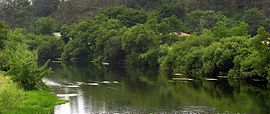| This article needs additional citations for verification. Please help improve this article by adding citations to reliable sources. Unsourced material may be challenged and removed. Find sources: "Ulla" river – news · newspapers · books · scholar · JSTOR (April 2017) (Learn how and when to remove this message) |
| Ulla River | |
|---|---|
 River Ulla River Ulla | |
 Map of the Río Ulla river basin Map of the Río Ulla river basin | |
| Native name | Río Ulla (Galician) |
| Location | |
| Country | Spain |
| State | Galicia (Spain) |
| Physical characteristics | |
| Source | |
| • location | Montes da Vacaloura, Monterroso, Province of Lugo |
| • coordinates | 42.745, -7.82 |
| • elevation | 570 m |
| Mouth | Ría de Arousa estuary |
| • location | near Catoira, Spain |
| • coordinates | 42.67, -8.73 |
| • elevation | sea level |
| Length | 132 km (82 mi) |
| Basin size | 2,800 km (1,100 sq mi) |
| Discharge | |
| • average | 79.3 m/s (2,800 cu ft/s) |
| Basin features | |
| Tributaries | |
| • left | Arnego, Deza, Liñares, Vea, Valga, Louro |
| • right | Pambre, Furelos, Beseña, Iso, Lañas, Brandelos, Santa Lucía, Sar |
The Ulla (río Ulla in Galician and Spanish) is a river in Galicia, Spain.
Its source is sometimes given as Antas de Ulla and sometimes the neighbouring municipality of Monterroso. It flows to the Ría de Arosa estuary near the city of Catoira, Spain. Its basin is the largest in Galicia after the Minho River. Tributaries include the rivers Deza and Arnego.
The river is also valued by archaeologists owing to the large number of artifacts, dating as far back as the Neolithic, discovered here. The outlet of the Ulla River and the mouth of the estuary, called Ría de Arousa, are the two sites where archaeologists have discovered remains consistently. Rock carvings have been discovered here. The Ulla River is also important because it is the river in the northwest of the Iberian Peninsula to produce a large number of watery hoards, which were discovered in its lower reaches and its mouth.
Etymology
According to E. Bascuas, "Ulla" is a form belonging to the old European hydronymy, and derived from the Indoeuropean root *wel- 'wheel, rotate'. This toponym is registered in 906 as "(fluvius) Volia", which had derived from a previous form *Wulia.
See also
References
- Río Barja, Francisco Javier; Rodríguez Lestegas, Francisco (1992). Os rios galegos : morfoloxia e rexime. Santiago de Compostela: Consello da cultura galega. p. 324. ISBN 8487172768.
- Cf. p. 541 of "La Hidronimia de Galicia: tres estratos ..". http://www.mondonedoferrol.org/estudios-mindonienses/MINDONIENSES%2024%20.pdf
External links
This article about a location in the autonomous community of Galicia, Spain is a stub. You can help Misplaced Pages by expanding it. |
This article related to a river in Spain is a stub. You can help Misplaced Pages by expanding it. |